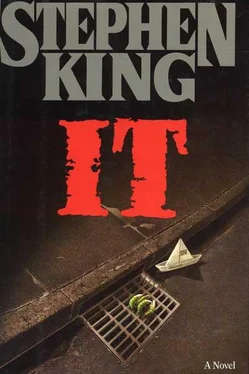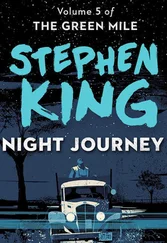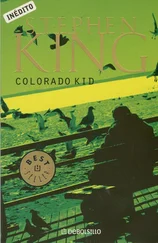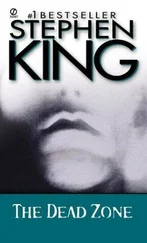Stephen King - It
Здесь есть возможность читать онлайн «Stephen King - It» весь текст электронной книги совершенно бесплатно (целиком полную версию без сокращений). В некоторых случаях можно слушать аудио, скачать через торрент в формате fb2 и присутствует краткое содержание. Год выпуска: 1986, Жанр: Ужасы и Мистика, на английском языке. Описание произведения, (предисловие) а так же отзывы посетителей доступны на портале библиотеки ЛибКат.
- Название:It
- Автор:
- Жанр:
- Год:1986
- ISBN:нет данных
- Рейтинг книги:4.33 / 5. Голосов: 3
-
Избранное:Добавить в избранное
- Отзывы:
-
Ваша оценка:
- 80
- 1
- 2
- 3
- 4
- 5
It: краткое содержание, описание и аннотация
Предлагаем к чтению аннотацию, описание, краткое содержание или предисловие (зависит от того, что написал сам автор книги «It»). Если вы не нашли необходимую информацию о книге — напишите в комментариях, мы постараемся отыскать её.
It — читать онлайн бесплатно полную книгу (весь текст) целиком
Ниже представлен текст книги, разбитый по страницам. Система сохранения места последней прочитанной страницы, позволяет с удобством читать онлайн бесплатно книгу «It», без необходимости каждый раз заново искать на чём Вы остановились. Поставьте закладку, и сможете в любой момент перейти на страницу, на которой закончили чтение.
Интервал:
Закладка:
At last, though, the tale was told. Bill looked around at them, both defiant and afraid. Eddie saw an identical expression on the faces of Ben, Richie, and Stan. It was solemn, awed fear. It was not in the slightest tinctured by disbelief. An urge came to him then, an urge to spring to his feet and shout: What a crazy story! You don’t believe that crazy story, do you, and even if you do, you don’t believe we believe it, do you? School pictures can’t wink! Books can’t bleed! You’re out of your mind, Big Bill!
But he couldn’t very well do so, because that expression of solemn fear was also on his own face. He couldn’t see it but he could feel it.
Come back here, kid, the hoarse voice whispered. I’ll blow you for free. Come back here!
No, Eddie moaned at it. Please, go away, I don’t want to think about that.
Come back here, kid.
And now Eddie saw something else-not on Richie’s face, at least he didn’t think so, but on Stan’s and Ben’s for sure. He knew what that something else was; knew because that expression was on his own face, too.
Recognition.
“I’ll blow you for free.
The house at 29 Neibolt Street was just outside the Derry trainyards. It was old and boarded up, its porch gradually sinking back into the ground, its lawn an overgrown field. An old trike, rusting and overturned, hid in that long grass, one wheel sticking up at an angle.
But on the left side of the porch there was a huge bald patch in the lawn and you could see dirty cellar windows set into the house’s crumbling brick foundation. It was in one of those windows that Eddie Kaspbrak first saw the face of the leper six weeks ago.
6
On Saturdays, when Eddie could find no one to play with, he often went down to the trainyards. No real reason; he just liked to go out there.
He would ride his bike out Witcham Street and then cut to the northwest along Route 2 where it crossed Witcham. The Neibolt Street Church School stood on the corner of Route 2 and Neibolt Street a mile or so farther on. It was a shabby-neat wood-frame building with a large cross on top and the words SUFFER THE LITTLE CHILDREN TO COME UNTO ME written over the front door in gilt letters two feet high. Sometimes, on Saturdays, Eddie heard music and singing coming from inside. It was gospel music, but whoever was playing the piano sounded more like Jerry Lee Lewis than a regular church piano player. The singing didn’t sound very religious to Eddie, either, although there was lots of stuff in it about “beautiful Zion” and being “washed in the blood of the lamb” and “what a friend we have in Jesus.” The people singing seemed to be having much too good a time for it to really be sacred singing, in Eddie’s opinion. But he liked the sound of it all the same-the way he liked to hear Jerry Lee hollering out “Whole Lotta Shakin” Goin” On.” Sometimes he would stop for awhile across the street, leaning his bike against a tree and pretending to read on the grass, actually jiving along to the music.
Other Saturdays the Church School would be shut up and silent and he would ride out to the trainyard without stopping, out to where Neibolt Street ended in a parking lot with weeds growing up through the cracks in the asphalt. There he would lean his bike against the wooden fence and watch the trains go by. There were a lot of them on Saturdays. His mother told him that in the old days you could catch a GS amp;WM passenger train at what was then Neibolt Street Station, but the passenger trains had stopped running around the time the Korean War was starting up. “If you got on the northbound train you went to Brownsville Station,” she said, “and from Brownsville you could catch a train that would take you all the way across Canada if you wanted, all the way to the Pacific. The southbound tram would take you to Portland and then on down to Boston, and from South Station the country was yours. But the passenger trains have gone the way of the trolley lines now, I guess. No one wants to ride a train when they can just jump in a Ford and go. You may never even ride one.”
But great long freights still came through Derry. They headed south loaded down with pulpwood, paper, and potatoes, and north with manufactured goods for those towns of what Maine people sometimes called the Big Northern-Bangor, Millinocket, Machias, Presque Isle, Houlton. Eddie particularly liked to watch the northbound car-carriers with their loads of gleaming Fords and Chevies. I’ll have me a car like one of those someday, he promised himself. Like one of those or even better. Maybe even a Cadillac!
There were six tracks in all, swooping into the station like strands of cobweb tending toward the center: Bangor and Great Northern Lines from the north, the Great Southern and Western Maine from the west, the Boston and Maine from the south, and Southern Seacoast from the east.
One day two years before, when Eddie had been standing near the latter line and watching a train go through, a drunken trainman had thrown a crate out of a slow-moving boxcar at Mm. Eddie ducked and flinched backward, although the crate landed in the cinders ten feet away. There were things inside it, live things that clicked and moved. “Last ran, boy!” the drunken trainman had shouted. He pulled a flat brown bottle from one of the pockets of his denim jacket, tipped it up, drank, then flipped it into the cinders, where it smashed. The trainman pointed at the crate. “Take em home to yer mum! Compliments of the Southern-Fucking-Seacoast-Bound-for-Welfare Line!” He had reeled forward to shout these last words as the train pulled away, gathering speed now, and for one alarming moment Eddie thought he was going to tumble right out.
When the train was gone, Eddie went to the box and bent cautiously over it. He was afraid to get too close. The things inside were slithery and crawly. If the trainman had yelled that they were for him, Eddie would have left them right there. But he had said take em home to your Mom, and, like Ben, when someone said Mom, Eddie jumped.
He scrounged a hank of rope from one of the empty quonset warehouses and tied the crate onto the package carrier of his bike. His mother had peered inside the crate even more warily than Eddie himself, and then she screamed-but with delight rather than terror. There were four lobsters in the crate, big two-pounders with their claws pegged. She cooked them for supper and had been extremely grumpy with Eddie when he wouldn’t eat any.
“What do you think the Rockefellers are eating this evening at their place in Bar Harbor?” she asked indignantly. “What do you think the swells are eating at Twenty-one and Sardi’s in New York City? Peanut butter and jelly sandwiches? They’re eating lobster, Eddie, same as we are! Now come on-give it a try.”
But Eddie wouldn’t-at least that was what his mother said. Maybe it was true, but inside it felt more to Eddie like couldn’t than wouldn’t. He kept thinking of the way they had slithered inside the crate, and the clicking sounds their claws had made. She kept telling him how delicious they were and what a treat he was missing until he started to gasp for breath and had to use his aspirator. Then she left him alone.
Eddie retreated to his bedroom and read. His mother called up her friend Eleanor Dunton. Eleanor came over and the two of them read old copies of Photoplay and Screen Secrets and giggled over the gossip columns and gorged themselves on cold lobster salad. When Eddie got up for school the next morning, his mother was still in bed, snoring away and letting frequent farts that sounded like long, mellow cornet notes (she was Getting Off Some Good Ones, Richie would have said). There was nothing left in the bowl where the lobster salad had been except a few tiny blots of mayonnaise.
Читать дальшеИнтервал:
Закладка:
Похожие книги на «It»
Представляем Вашему вниманию похожие книги на «It» списком для выбора. Мы отобрали схожую по названию и смыслу литературу в надежде предоставить читателям больше вариантов отыскать новые, интересные, ещё непрочитанные произведения.
Обсуждение, отзывы о книге «It» и просто собственные мнения читателей. Оставьте ваши комментарии, напишите, что Вы думаете о произведении, его смысле или главных героях. Укажите что конкретно понравилось, а что нет, и почему Вы так считаете.











